An unlikely pairing of Lou Reed and Metallica, the album Lulu was released on Halloween day 2011. Most critics savaged it. Lulu, wrote Pitchfork, “is a frustratingly noble failure. Audacious to the extreme, but exhaustingly tedious as a result, its few interesting ideas are stretched out beyond the point of utility and pounded into submission.” Entertainment Weekly gave it a D rating and the reviewer for the British magazine The Quietus said that the listener’s time would be “better spent watching grass grow.”
Even Reed’s wife, avant-garde musician Laurie Anderson, was guarded in comments she made at the time, stating publicly that the recording was full of rage and anger.
But David Bowie considered it Reed’s masterpiece, and Rolling Stone was at least willing to find something salvageable within Lulu’s two discs, awarding it three out of five stars and noting, “Things can get ponderous once Metallica start impatiently stomping, but often they turn Reed’s pretensions into something muscular.”
Lulu did have its supporters, but they weren’t many. Neither Reed nor Metallica acolytes, for the most part, were happy with the music they made together. Reed even reported receiving death threats from some “fans” over the album.
The collaboration came about after Reed and Metallica performed together at the Rock and Roll Hall of Fame’s 25th anniversary at Madison Square Garden in 2009. The music they created together was based on the Lulu plays of German playwright Frank Wedekind, which they recorded live in the studio. Lulu opened at #36 on the Billboard album chart, based on a mere 13,000 copies sold. It went straight downhill from there.
Lulu turned out to be Reed’s final full-length studio album. He died on October 27, 2013, at age 72. Reflecting on the experience following Reed’s death, Metallica’s Lars Ulrich said, “We were both outsiders. We both never felt comfortable going down the same path that everyone else was doing. Lou Reed is the godfather of being an outsider, being autonomous, marching to his own drum, making every project different from the previous one and never feeling like he had a responsibility to anybody other than himself. We shared kinship over that.”
Best Classic Bands’ editor Jeff Tamarkin interviewed Reed just days after the album’s release, in November 2011. In 2016, we presented, for the first time anywhere, that interview in its entirety.
What was it about the Lulu music that required the level of power that Metallica could give it?
Lou Reed: I’d originally done it as a project for the Berlin Ensemble Theater with Robert Wilson, and that went in one direction. Then Metallica and I wanted to work together ever since we played together at the Rock and Roll Hall of Fame. I thought it would be amazing to have that kind of muscle in back of the whole thing and really give it the kind of power it deserved.
How did you and Metallica work together?
LR: It was all instinctual. Nobody thought about anything. We were doing this because we wanted to do this. No one asked us to. It was just a great opportunity to play together. I had a certain sound and thought in my head that I wanted to try to get and I got it.
Did Metallica immediately understand what you had in mind?
LR: These [songs] were written before I saw them but it was written with electronics and strings because there’s no way anybody in Germany could do this. I’d sent it to [Metallica’s] Lars Ulrich and James [Hetfield] to see if they were even game for it. They loved the idea and we got together and just tore through it, in 10 days.
Related: In 1998, Lou Reed played the White House. Really.
What was the studio atmosphere like?
LR: It was their own studio and if I had the opportunity in New York to set up a studio, I would do what they did, which is tons of leakage, everybody playing at the same time, everybody can see each other. The vocal is not in a vocal booth. It’s live, put it that way.
That’s a lost art, recording that way.
LR: People have gotten into the habit of putting an amp into one room and the vocalist in another room and blah blah. This is the opposite. And you need a certain kind of engineer because some engineers are really obsessed with that. They’ll say to you, “Now your voice has a guitar on it and I can’t make that go away.” But we were working with a guy who is used to this and we wanted that. I didn’t mind that the vocal was not pristine. When you start doing that it turns into one of these incredibly clean digital records. This is singing with the band live.
Was there a lot of improvisation?
LR: That is what we did. They were very well prepared. They had listened, gone over the lyrics, and they had some things together to say, like “What do you think of this? What do you think of that?”
James and Lars have said that there were times when you would change a key on the spot and they had to follow your lead.
LR: They’re certainly used to doing it as players, just go where it goes.
What was Hal Willner’s role as one of the co-producers of Lulu?
LR: He’s got an encyclopedic knowledge of everything, especially music, and a great set of ears to hear when something is working or not, and great ideas about ways to blend things. He’s a producer; that’s what they do.
Did Metallica push you to a musical place you hadn’t gone to before?
LR: We were all on the same rocket ship. It’s not a normal recording by any stretch. This was not made for a record company; keep that in mind. We funded it. There was no one to say, “You can’t do that,” or go through this whole bag of sh*t. We essentially saw everything the same way. They’re into heavy metal, I’m into heavy guitar, so it was no big stretch. They were so ready to go, it was thrilling. It’s like someone gave you a Ferrari for free.
Watch Lou Reed and Metallica at the 2009 Rock and Roll Hall of Fame concert
You’ve said that you were fascinated by the psychology behind the Lulu character.
LR: I’d done a thing about Edgar Allen Poe called The Raven and a good part of that was the fascination with the psychology of it. The Lulu story has been around forever, in various forms: through the [Alban] Berg operas, through [the 1929 German film] Pandora’s Box with Louise Brooks, right into the latest version, which is Robert Wilson’s. There are certain ways of looking at things that are in that basic story. The basic story is about a woman who, in those days, had to be killed because she is, quote, a bad girl. If she was a man it wouldn’t end with Jack the Ripper. And if it was today, you might not have to have her killed off at the end. But this story is from decades ago, and that’s what happened to women who crossed that line. It was a lot of fun for me to get into writing from the different characters.
Was it difficult to adapt the story to contemporary times?
LR: I don’t know; it’s such a basic plot that there’s nothing to adapt.
Some people have said you were going for shock value with your lyrics.
LR: People are *ssholes. If you want to get shocked, go and see [the 2011 film] Drive. It’s so f**king stupid. I don’t know why I even bother answering sh*t like this. People are shocked. Bullsh*t. They’re not shocked by sh*t. There’s not one movie that starts off without a woman getting decapitated these days, except they’re bad movies written by hacks. This is a classic story and it’s written by me. I don’t have to shock anybody. I’ve said two million times, does anybody out there read anything? What about Hubert Selby? You’re talking about people with the IQ of a saltshaker.
How did the cover art come about?
LR: They worked with this guy David Turner, and David Turner came up with some stuff after hearing what we were doing. One of them was a picture of this mannequin from a German museum. We all took one look and said, “That’s Lulu.” We took off from there. To prove that the proportions were correct, they found a model with the same measurements as the mannequin from the top, and then the bottom half in every single one of those photos is the real model. No one knows who did it—it’s plaster and wax and just insanely striking. That was Lulu. The way we did this is that if everybody didn’t agree, we didn’t do it. It wasn’t majority rules; it was all together or nothing.
Do you have any plans to tour behind Lulu?
LR: I don’t know. It’s a very intense physical; album to perform.
Do you see any parallels between Lulu and [Reed’s 1975 album of feedback] Metal Machine Music in terms of the intensity?
LR: I can’t imagine what.
Listen to “The View,” a track from the Reed/Metallica collaboration Lulu

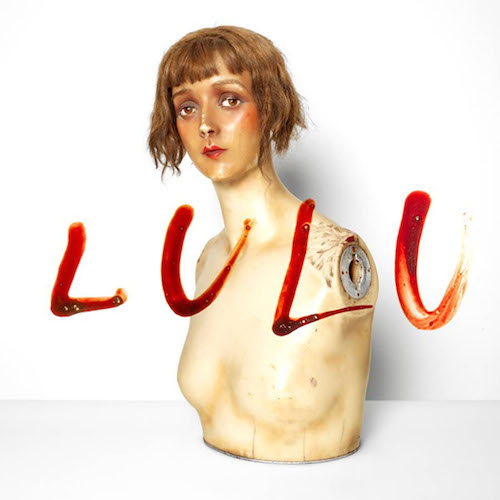


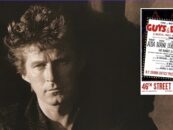
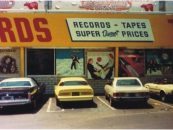
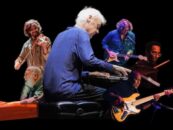
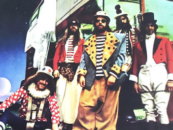

No Comments so far
Jump into a conversationNo Comments Yet!
You can be the one to start a conversation.